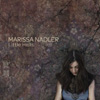Marissa Nadler, "Little Hells"
 On her fourth full-length album, Marissa Nadler takes a conscious step away from the folk purity of her earlier work, filling out her sound with full band arrangements featuring drums, bass guitar, and keyboards. The gamble pays off handsomely, and the indie-folk pinup girl and mistress of the murder ballad delivers one of her finest albums yet.
On her fourth full-length album, Marissa Nadler takes a conscious step away from the folk purity of her earlier work, filling out her sound with full band arrangements featuring drums, bass guitar, and keyboards. The gamble pays off handsomely, and the indie-folk pinup girl and mistress of the murder ballad delivers one of her finest albums yet.
Marissa Nadler's appeal is so simple that it's hard to explain. Though certainly her fingerpicking style is lovely, there are doubtless other artists who could dwarf her abilities. Her voice is evocative but often drenched in reverb, which is not at all an uncommon strategy for artists looking to add some haunt and atmosphere to their work. Her songs are often simplistic, and across her four albums there are certainly moments of déja vu for a careful listener; similar melodic progressions get trotted out repeatedly, and the lyrical imagery draws from such a recognizably discrete set of themes that, at this point, it would probably be possible to make a Marissa Nadler magnetic poetry lyric set for refrigerator doors everywhere. What makes Marissa Nadler's music irresistible is not reducible to any of its component parts. It's something else, something intangible, something approaching what Roland Barthes called "the grain of the voice," but somehow even less definable. Either you "get it" or you don't, and luckily, critics and listeners everywhere seem to be "getting" Marissa Nadler more with each successive release. Given this trajectory, Little Hells may well be Nadler's breakthrough album.
It's her breakthrough album because she sticks to what she knows; simple, melancholic fingerpicked folk ballads that take advantage of her sonorous, spine-tingling vocals, narrating tales of damsels in distress or lovers absent or dead. What has changed are the arrangements; many of these tracks feature a full band backing up the singer-songwriter, a band drawn from the ranks of groups like Blonde Redhead, Beachwood Sparks, and Vetiver. Sure, Nadler has had accompaniment in the past, notably some subtle synths here and there on her debut, and the electric third-eye soloing of Greg Weeks on her last album Songs III: Bird On the Water, but she has never tried for a traditional rock sound, which is her big gamble on Little Hells. Not that you would know it from the first track "Heartpaper Lover," which uses a limited sound palette with no rhythm section, just Marissa's multitracked vocals and guitar, with atmospheric air raid synths forming a creepy backdrop. But on the album's second track, "Rosary," everything changes. Not only does the track feature drums and bass, but also a noticeably jauntier and more confident performance from Nadler herself.
The changes get even more intense with tracks like "Mary Comes Alive," which add synths to the already maximalist arrangement, and ends up sounding like a lost Mazzy Star B-side. This is not to say that Marissa has abandoned her folk origins, and many tracks here retain a sense of that witchy Brit-folk vibe that made an album like The Saga of Mayflower May so appealing. More notable than the continuities are the disruptions, however, a track such as "Mistress," which incredibly, is nothing less than full-bore countrified rock, Nadler singing from the point of view of a joyful adulteress: "Goodbye misery/linens on the line...Come in now, you know I won't desert you/It's been four years waiting for the day/That would you would leave your girl and take me/Somewhere away." The production on Marissa's voice is top-notch throughout the album, transforming the sometimes miasmic muddle of past albums into vocals that are at once nebulous and piercing, like a whisp of smoke that spontaneously forms into distinct but ephemeral shapes before melting back into undifferentiated haze.
Little Hells is a fantastic album that completely transcends any tenuous association that Marissa Nadler might once have had with the annoying, and now dead, indie "freak-folk" scene. There are no willful eccentricities on display here; just a great singer-songwriter with incredible poise, seemingly in full control of her aesthetic, spinning ten haunting narratives in musical miniature.
samples:



